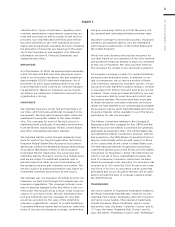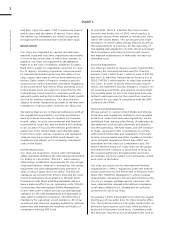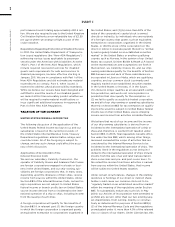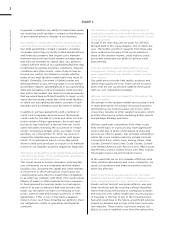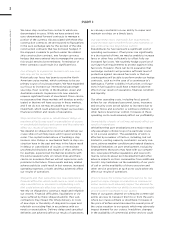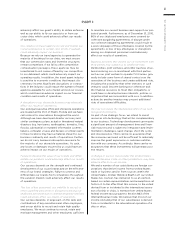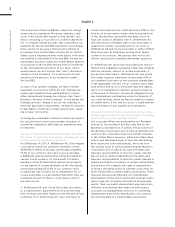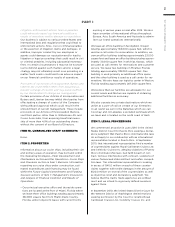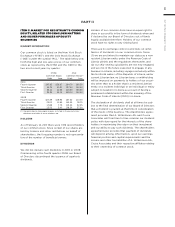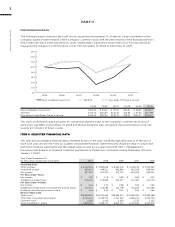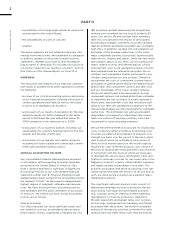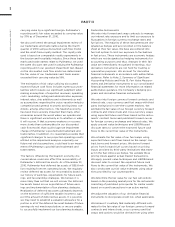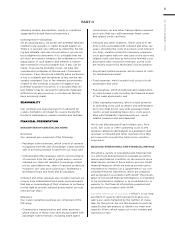Royal Caribbean Cruise Lines 2010 Annual Report Download - page 34
Download and view the complete annual report
Please find page 34 of the 2010 Royal Caribbean Cruise Lines annual report below. You can navigate through the pages in the report by either clicking on the pages listed below, or by using the keyword search tool below to find specific information within the annual report.
PART I
ROYAL CARIBBEAN CRUISES LTD. 31
adversely affect our guest’s ability to obtain airfare as
well as our ability to fly our guests to or from our
cruise ships which could adversely affect our results
of operations.
Our reliance on travel agencies to sell and market our
cruises exposes us to certain risks which, if realized,
could adversely impact our business.
Because we rely on travel agencies to generate the
majority of bookings for our ships, we must ensure
that our commission rates and incentive structures
remain competitive. If we fail to offer competitive
compensation packages, these agencies may be
incentivized to sell cruises offered by our competitors
to our detriment, which could adversely impact our
operating results. In addition, the travel agent industry
is sensitive to economic conditions that impact dis-
cretionary income. Significant disruptions or contrac-
tions in the industry could reduce the number of travel
agencies available for us to market and sell our cruises,
which could have an adverse impact on our financial
condition and results of operations.
A disruption in our shoreside business may adversely
affect our results of operations.
Our principal executive office and shoreside operations
are located at the Port of Miami, Florida and we have
call centers for reservations throughout the world.
Although we have developed disaster recovery and
similar contingency plans, actual or threatened natural
disasters (e.g. hurricanes, earthquakes, tornados, fires,
floods), substantial or repeated information systems
failures, computer viruses and hackers or similar events
in these locations may have a material impact to our
business continuity and results of operations. Further,
we do not carry business interruption insurance for
the majority of our shoreside operations. As such,
any losses or damages incurred by us could have an
adverse impact on our results of operations.
Failure to develop the value of our brands and differ-
entiate our products could adversely affect our results
of operations.
Our success depends on the strength and continued
development of our cruise brands and on the effec tive-
ness of our brand strategies. Failure to protect and
differentiate our brands from competitors throughout
the vacation market could adversely affect our results
of operations.
The loss of key personnel, our inability to recruit or
retain qualified personnel or disruptions among our
shipboard personnel due to strained employee relations
could adversely affect our results of operations.
Our success depends, in large part, on the skills and
contributions of key executives and other employees,
and on our ability to recruit and retain high quality
employees. We must continue to recruit, retain and
motivate management and other employees sufficient
to maintain our current business and support our pro-
jected growth. Furthermore, as of December 31, 2010,
80% of our shipboard employees were covered by
collective bargaining agreements. A dispute under
our collective bargaining agreements could result in
a work stoppage of those employees covered by the
agreements. A loss of key employees or disruptions
among our shipboard personnel could adversely
affect our results of operations.
Business activities that involve our co-investment with
third parties may subject us to additional risks.
Partnerships, joint ventures, and other business struc-
tures involving our co-investment with third parties,
such as our joint venture to operate TUI Cruises, gen-
erally include some form of shared control over the
operations of the business and create additional risks,
including the possibility that other investors in such
ventures could become bankrupt or otherwise lack
the financial resources to meet their obligations, or
could have or develop business interests, policies or
objectives that are inconsistent with ours. In addition,
actions by another investor may present additional
risks of operational difficulties.
We may not realize the intended benefits of our tech-
nological investments.
As part of our strategic focus, we intend to invest
resources into technology that will be complementary
to our business. Technology development can require
a significant amount of management time and finan-
cial resources and is subject to integration and imple-
mentation challenges, rapid change, short life cycles
and obsolescence. There can be no assurances that
the resources we invest will be sufficient to materially
improve the guest experience or customer satisfac-
tion with our company. Accordingly, there can be no
assurances that these investments will generate posi-
tive returns.
A change in our tax status under the United States
Internal Revenue Code, or other jurisdictions, may have
adverse effects on our income.
We and a number of our subsidiaries are foreign cor-
porations that derive income from a United States
trade or business and/or from sources within the
United States. Drinker Biddle & Reath LLP, our United
States tax counsel, has delivered to us an opinion,
based on certain representations and assumptions set
forth in it, to the effect that this income, to the extent
derived from or incidental to the international opera-
tion of a ship or ships, is exempt from United States
federal income tax pursuant to Section 883 of the
Internal Revenue Code. We believe that most of our
income (including that of our subsidiaries) is derived
from or incidental to the international operation of a
ship or ships.


